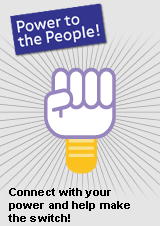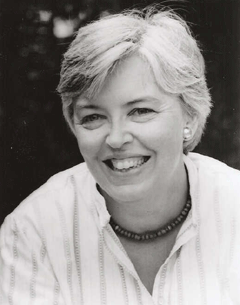Power to the People
Air Date: Week of January 25, 2008

The Power to the People campaign stamp- modeled after and LED lightbulb. (Photo: EarthAction)
The new campaign "Power to the People" aims to convince states to adopt legislation that would decentralize the nation's power grid and allow individuals to profit from creating their own renewable energy. Lois Barber, executive director of the EarthAction Network, gives host Bruce Gellerman the details.
Transcript
GELLERMAN: When John Lennon recorded this song back in 1971, it soon became an anthem for a generation.
[MUSIC: John Lennon & The Plastic Ono Band “Power to the People” (Apple/EMI 1971)]
GELLERMAN: But today a new generation is embracing the song's slogan and message.
[MUSIC: John Lennon & The Plastic Ono Band “Power to the People” (Apple/EMI 1971)]
GELLERMAN: They’re saying power to the people is an idea whose time has finally come and that climate change means time is running out. Power to the People is the name of a new collaborative campaign organized by the Earth Action Network and the World Future Council. The goal: to get states to adopt legislation to decentralize the nation's power supply.
Joining us from Amherst, Massachusetts is co-founder and Executive Director of Earth Action Network is Lois Barber. Lois, hi!
BARBER: Hi, it’s nice to be here.
GELLERMAN: Or should I say ‘right on.’ When I hear this song I kind of revert back to my roots.
BARBER: Right. So do I. One of our symbols for this campaign on our poster is a lightbulb in the shape of a fist, and it says power to the people. And I think it really talks about this transition of how now energy is where power is.
GELLERMAN: Well exactly what is it that you’re trying to do?

Lois Barber of EarthAction (Photo: EarthAction)
GELLERMAN: I was looking on the Earth Action webpage and there’s a link to your campaign, Power to the People. And the legislation that you want to introduce here is based upon legislation that first showed up in Europe, in Germany.
BARBER: Right. Germany, Denmark, Spain have all been leaders.
GELLERMAN: And what is that legislation specifically?
BARBER: Well it does three things. It requires utility companies to buy all the renewable energy that’s produced in their region. They can’t have favorites. They can’t, you know, just buy oil and coal and not buy renewable energy. Secondly, they have to pay a certain price for that renewable energy that’s set by a board. And thirdly they have to pay that price for a very specific number of years. Usually it’s fifteen to twenty years—a very decentralized model.
GELLERMAN: It’s called ‘feed in tariff.’ That’s a mouthful.
BARBER: It is. It was named this in Europe. The words really don’t have a lot of meaning here in the United States. They’re actually a little scary—tariff always makes me think of taxes. So tariff has a different meaning in Europe. But the idea of feed in comes from that individual producers can feed the electricity that they produce into the grid and get paid for it.
GELLERMAN: Has it been successful in Europe?
BARBER: Oh it’s been amazing. It’s made Germany the absolute number one leader in renewable energy worldwide. It’s created over two hundred and 30 thousand jobs in the renewable energy sector in Germany. It’s helped Germany meet its renewable energy goals of 12 percent of their renewable energy now comes from renewables, and they met those goals three years early. They’re now the number one exporter of solar panels and other renewable energy technology.

The Power to the People campaign stamp- modeled after and LED lightbulb. (Photo: EarthAction)
BARBER: (laughs) No. Although it’s not a bad idea. I just visited a yurt last weekend. It was charming. No, you know, and I really know about this issue from my personal life, too. In 1971 with a small group of people I went to northern British Columbia, Canada, as a sort of retreat from the industrialized world. And tried to live as simply and sustainably as possible. And one of the things we did was develop our own hydroelectric system off the creek that ran by our house. So I really got very personally familiar with what energy means. This isn’t a new idea, but it’s an idea that’s now necessary. I mean, in 1971 it was sort of a bit of a luxury to be able to go and be part of the back-to-the-land movement. But nowadays, it’s not an option. Everybody has to be part of this movement of switching from fossil fuels to renewable energy.
GELLERMAN: Now your campaign targets nine states, right? In the United States? One of those is Michigan. And they already have legislation pending that would accomplish many of your goals. Am I right?
BARBER: That’s right. Representative Kathleen Law—just as we were getting started with our campaign here we learned that she was a little bit ahead of us. She had already introduced a piece of legislation.
GELLERMAN: Lois, how likely do you think the American public is to embrace, not just the goals, but the means and the methods, to become, you know, basically energy independent of the big companies?
BARBER: Well I think the American people, once they learn about this type of legislation, are actually going to demand it from our government because it helps meet their needs. It’ll create jobs. You know every state that produces renewable energy will be able to keep the revenue from that renewable energy within their state to help meet state budgets.
GELLERMAN: Well, Lois, thank you very much.
BARBER: Well, your welcome. It’s been a pleasure to be here.
GELLERMAN: Lois Barber is the cofounder and executive director of Earth Action Network, which is collaborating with the World Future Council on the Power to the People campaign.
Links
Living on Earth wants to hear from you!
Living on Earth
62 Calef Highway, Suite 212
Lee, NH 03861
Telephone: 617-287-4121
E-mail: comments@loe.org
Newsletter [Click here]
Donate to Living on Earth!
Living on Earth is an independent media program and relies entirely on contributions from listeners and institutions supporting public service. Please donate now to preserve an independent environmental voice.
NewsletterLiving on Earth offers a weekly delivery of the show's rundown to your mailbox. Sign up for our newsletter today!
 Sailors For The Sea: Be the change you want to sea.
Sailors For The Sea: Be the change you want to sea.
 The Grantham Foundation for the Protection of the Environment: Committed to protecting and improving the health of the global environment.
The Grantham Foundation for the Protection of the Environment: Committed to protecting and improving the health of the global environment.
 Contribute to Living on Earth and receive, as our gift to you, an archival print of one of Mark Seth Lender's extraordinary wildlife photographs. Follow the link to see Mark's current collection of photographs.
Contribute to Living on Earth and receive, as our gift to you, an archival print of one of Mark Seth Lender's extraordinary wildlife photographs. Follow the link to see Mark's current collection of photographs.
 Buy a signed copy of Mark Seth Lender's book Smeagull the Seagull & support Living on Earth
Buy a signed copy of Mark Seth Lender's book Smeagull the Seagull & support Living on Earth

